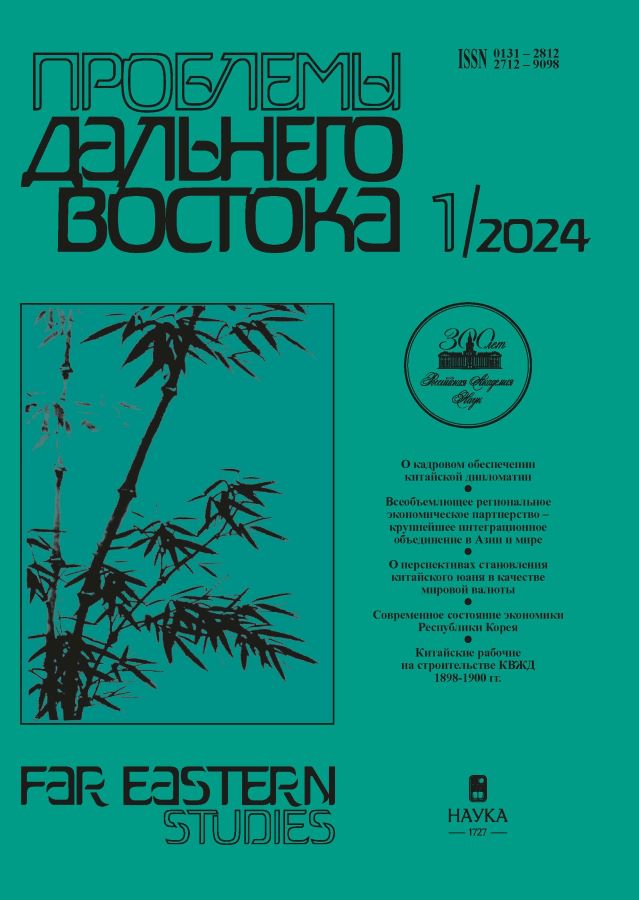On the Staffing of Chinese Diplomacy
- Autores: Portyakov V.Y.1
-
Afiliações:
- Institute of China and Contemporary Asia of the Russian Academy of Sciences
- Edição: Nº 1 (2024)
- Páginas: 7-18
- Seção: Politics
- URL: https://rjmseer.com/0131-2812/article/view/676370
- DOI: https://doi.org/10.31857/S0131281224010012
- ID: 676370
Citar
Texto integral
Resumo
Recent events — the adoption of the “Law on foreign policy", the general significant activation of the People's Republic of China on the world stage, the resignation of the country's Foreign Minister Qin Gang and the return to the leadership of the Foreign Ministry Wang Yi — attract increased attention to Chinese diplomacy today. Meanwhile, this topic has not been fully disclosed in Russian and foreign studies. The main reason is the obvious opacity of the object of analysis. It is unlikely that Chinese diplomacy can be called completely closed, but information about it has to be collected literally bit by bit. The recently published texts by K.M. Barsky and E.V. Zhuravleva are very useful in this regard. Somewhat earlier, the formation of Chinese diplomacy was reviewed by Wang Chunying, a professor at the Diplomatic Academy in Beijing. Among the English-language efforts addressing the problems of Chinese diplomacy, John Garver's monograph "Chinese Quest: The History of International Relations of the People's Republic of China" (2016) should be mentioned. In general, this topic is far from being exhausted and requires further study. Our article examines in detail the features of the initial stage of the formation of the diplomatic personnel corps in the People's Republic of China, analyzes the evolution of forms and methods of training and retraining of Chinese diplomats, the legal regulation of their obligations and rights. The activities of the country's foreign ministers from 1949 to the present (Zhou Enlai, Chen Yi, Ji Pengfei, Qiao Guanhua, Huang Hua, Wu Xueqian, Qian Qichen, Tang Jiaxuan, Li Zhaoxing, Yang Jiechi, Wang Yi, Qin Gang) are briefly described.
Palavras-chave
Sobre autores
V. Portyakov
Institute of China and Contemporary Asia of the Russian Academy of Sciences
Autor responsável pela correspondência
Email: p481nov@mail.ru
ORCID ID: 0000-0001-9188-2341
Chief Research Fellow, Centre for Political Studies and Forecasting
MoscowBibliografia
- Barskiy K.M. K voprosu o formirovanii sovremennoi kitaiskoi diplomatisheskoi shkoly [On the issue of the formation of a modern Chinese diplomatic school]. Rossijskoe kitaevedenie. 2023. No. 1. S. 100–116. (In Russ.)
- Chen Jin. China in Mao Zedong era — Beijing, Foreign Languages Press, 2018. 290 p.
- Garver J. China’s Quest: The History of the Foreign Relations of the People’s Republic of China — New York, Oxford University Press, 2016. 868 p.
- Mao Zedong. O demokraticheskoi diktature naroda. K 28-i godovshchine osnovaniya Kommunisticheskoi partii Kitaya. Izbrannye proizvedeniya [About the democratic dictatorship of the people. On the 28th anniversary of the founding of the Communist Party of China. Selected works]. T. IV. Pekin. Izdatel’stvo literatury na inostrannykh yazykakh, 1969. S. 501–518. (In Russ.)
- Myasnikov V.S. Kratkiy ocherk istorii diplomatii KNR (60-e — nachalo 80-kh godov) [A brief outline of the history of the PRC’ diplomacy (60s — early 80s)]. M.: IDV AN SSSR, 1988. 188 s. (In Russ.)
- Volokhova А.А. Osnovy kitaiskoi diplomatii — Diplomaticheskaya akademiya MID RF [Fundamentals of Chinese diplomacy. Diplomatic Academy of the Ministry of Foreign Affairs of the Russian Federation]. М.: 2007. 151 s. (In Russ.)
- Xi Jinping. Stremit'sya sformirovat' novuyu obstanovku v diplomatii velikoj derzhavy s kitajskoj specifikoj (22 iyunya 2018 goda) [To strive to create a new environment in great power diplomacy with Chinese characteristics (June 22, 2018)]. O gosudarstvennom upravlenii. T. 3. Pekin. Izdatel'stvo literatury na inostrannyh yazykah KNR. 2021. 846 s. (In Russ.)
- Zhuravleva E.V. Diplomaticheskaya sluzhba KNR. Ministerstvo inostrannykh del [Diplomatic Service of the People's Republic of China. The Ministry of Foreign Affairs]. Sovremennoe kitajskoe gosudarstvo/ Gl. red. A.V. Vinogradov. T. 1 «Osnovnye instituty gosudarstvennoj vlasti i upravleniya». M.: RAN, 2022. S. 570–577. (In Russ.)
- 外交部: 将继续为国内省市开展对外交流合作牵线搭桥 [Ministry of Foreign Affairs: Will continue to serve as a bridge for domestic provinces and cities to carry out foreign exchanges and cooperation].人民日报. 24.02.2024. (In Chin.)
- 王春英: 中国 外交官职业化与中国特色大国外交 [Wang Chunying. Professionalization of Chinese Diplomats and Diplomacy of Great Powers with Chinese Characteristics]. 外交评论. 2021年. 第 7 期.第34–49 页. (In Chin.)
- 耿向东: 图解中国外交 [Geng Xiangdong. Illustration of Chinese diplomacy]. 北京, 2012年. 196页. (In Chin.)
- 谢益显 (主编): 中国当代外交史 (1949–2009) [Xie Yixian (Editor-in-chief). History of Contemporary Chinese Diplomacy (1949–2009)]. 北京, 中国青年出版社, 2009年. 562页. (In Chin.)
- 徐行: 周恩来与中日关系的历史性转折 [Xu Xing. Zhou Enlai and the historic turning point in relations of China with Japan]. 天津, 天津社会科学院出版社, 2010年. 296页. (In Chin.)
- 中华人民共和国驻外外交人员法 [Law of the People's Republic of China on Diplomatic Personnel Abroad]. 中华人民共和国外交部. URL: https://www.mfa.gov.cn/web/wjb_673085/zfxxgk_674865/zcfg/fl/201802/t20180214_9276668.shtml (accessed: 12.01.2024). (In Chin.)
Arquivos suplementares










